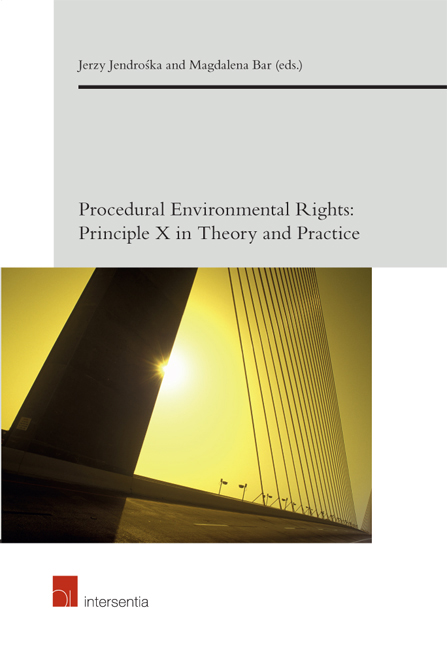Book contents
- Frontmatter
- Contents
- Introduction Procedural Environmental Rights in Theory and Practice
- Procedural Environmental Rights: Status and Developments
- Procedural Environmental Rights in Practice
- Public Participation
- Access to Justice
- Access to Environmental Justice in India: Innovation and Change
- The Scope of the Review in Environment-related Disputes in the Light of the Aarhus Convention and EU Law – Tensions between Effective Judicial Protection and National Procedural Autonomy
- Implementation of the Aarhus Convention through Actio Popularis – Article 9(3) of the Aarhus Convention and Actio Popularis
- Procedural Environmental Rights and Nature Protection
- Procedural Environmental Rights and EIA
- Procedural Environmental Rights and Climate Change
Implementation of the Aarhus Convention through Actio Popularis – Article 9(3) of the Aarhus Convention and Actio Popularis
from Access to Justice
Published online by Cambridge University Press: 12 October 2018
- Frontmatter
- Contents
- Introduction Procedural Environmental Rights in Theory and Practice
- Procedural Environmental Rights: Status and Developments
- Procedural Environmental Rights in Practice
- Public Participation
- Access to Justice
- Access to Environmental Justice in India: Innovation and Change
- The Scope of the Review in Environment-related Disputes in the Light of the Aarhus Convention and EU Law – Tensions between Effective Judicial Protection and National Procedural Autonomy
- Implementation of the Aarhus Convention through Actio Popularis – Article 9(3) of the Aarhus Convention and Actio Popularis
- Procedural Environmental Rights and Nature Protection
- Procedural Environmental Rights and EIA
- Procedural Environmental Rights and Climate Change
Summary
ABSTRACT
In the light of topical discussions on the need to broaden the legal standing approach in order to fulfil the requirements of the Aarhus Convention, and thus to facilitate enforcement of environmental law, this article is aimed at discussing the most extensive approach to legal standing (often referred to as an actio popularis or open standing). The main focus of the discussion is on Article 9(3) of the Convention, also known as the “enforcement provision,” which is claimed to be one of the most challenging provisions with respect to its implementation. Since its adoption there are calls requiring to implement Article 9(3) through an actio popularis; however, there are not so many examples in the EU where such an approach to legal standing has been introduced. This article explores how it has been developed through the legislation and court practice in Latvia, addressing also some pros and cons.
The most extensive approach to legal standing is analysed in the context of today's challenges to ensure better enforcement of environmental law, where open standing can be one (if small) response to these challenges.
KEYWORDS
Aarhus Convention; actio popularis; legal standing
INTRODUCTION
Environmental protection currently has a prominent place on the international political agenda, with environmental concerns having received special attention since the 1970s. The first global United Nations Conference on the Human Environment in Stockholm in 1972 is often singled out as an important turning point. An impressive amount of environmental legislation has since been adopted; however, scarcity of resources and environmental degradation both pose difficult dilemmas today just as they did in the 1970s. It seems to be true that the situation has even worsened as serious additional environmental challenges have emerged. It is fair to note that “there are some important success stories” in the field of environmental protection; at the same time, “more greenhouse gases than ever are put into the atmosphere, biological diversity is rapidly declining and fish stocks in the oceans are dwindling.” As there are “more than 500 international treaties and agreements that relate to the environment,” it is clear that the challenges primarily lie in the implementation and enforcement of already existing commitments and legislation.
Without any doubt, there could be different legal mechanisms and solutions for implementing the requirements needed to ensure environmental protection.
- Type
- Chapter
- Information
- Procedural Environmental RightsPrinciple X in Theory and Practice, pp. 261 - 284Publisher: IntersentiaPrint publication year: 2018



